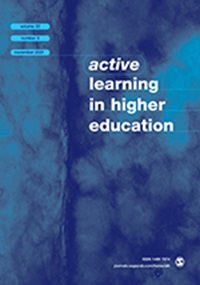作弊还是不作弊?Z世代伦理行为调查
IF 3.8
1区 教育学
Q1 EDUCATION & EDUCATIONAL RESEARCH
引用次数: 2
摘要
高等教育中的作弊有许多负面影响,包括降低项目声誉、提高学生保留率和培养不良道德行为,所有这些都对学生毕业后在工作场所的行为产生了影响。因此,通过了解目前的学生群体Z世代,有人认为教师更有能力打击作弊行为。本研究以计划行为理论和威慑理论为基础,考察了教师可以影响的因素,特别是阻止作弊的作业控制和作业类型。Z世代学生表示,他们对教师使用作业控制的看法增加了他们被抓住的感觉,这反过来又减少了作弊意图。学生更有可能在书面作业和考试中作弊。此外,作业控制可以最大限度地减少作业作弊。这项研究对那些尽量减少作弊机会的人有重要的启示。本文章由计算机程序翻译,如有差异,请以英文原文为准。
To cheat or not to cheat? An investigation into the ethical behaviors of generation Z
Cheating in higher education has numerous negative implications, including degrading program reputations, inflating student retention rates, and cultivating poor ethical practices, all of which have implications for what students do in the workplace after graduation. Therefore, by understanding the current student population, Generation Z, it is argued that faculty are better equipped to combat cheating behaviors. Grounded in the Theory of Planned Behavior and Deterrence Theory, this study examines factors that faculty can influence, in particular, assignment controls to deter cheating and types of assignments given. Generation Z students indicated that their perceptions of faculty’s use of assignment controls increased their perception of getting caught, which, in turn, decreased cheating intentions. Students were more likely to cheat on coursework over written assignments and examinations. Furthermore, assignment controls create the greatest decrease in coursework cheating. This study has important implications for those involved in minimizing cheating opportunities.
求助全文
通过发布文献求助,成功后即可免费获取论文全文。
去求助
来源期刊

Active Learning in Higher Education
EDUCATION & EDUCATIONAL RESEARCH-
CiteScore
13.20
自引率
12.00%
发文量
31
期刊介绍:
Active Learning in Higher Education is an international, refereed publication for all those who teach and support learning in higher education (HE) and those who undertake or use research into effective learning, teaching and assessment in universities and colleges. The journal is devoted to publishing accounts of research covering all aspects of learning and teaching concerning adults in higher education. Non-discipline specific and non-context/country specific in nature, it comprises accounts of research across all areas of the curriculum; accounts which are relevant to faculty and others involved in learning and teaching in all disciplines, in all countries.
 求助内容:
求助内容: 应助结果提醒方式:
应助结果提醒方式:


